 Top Chinese fashion icons in foreigners' eyes
Top Chinese fashion icons in foreigners' eyes
 Asia's largest business aviation exhibition to be held in Shanghai
Asia's largest business aviation exhibition to be held in Shanghai
 World's top-rated luxury hotels
World's top-rated luxury hotels
 Backstage at China Fashion Week
Backstage at China Fashion Week
 'Model husband' shatters image of love
'Model husband' shatters image of love
 Top 10 billionaires in the liquor industry
Top 10 billionaires in the liquor industry
 Wu Jing, Xie Nan to hold wedding on May
Wu Jing, Xie Nan to hold wedding on May
 London Cake International attracts tourists
London Cake International attracts tourists
 Let's dance in harmonic Shaanxi
Let's dance in harmonic Shaanxi
 Christie's to auction dazzling diamonds
Christie's to auction dazzling diamonds
KIEV, April 15 -- Russia warned Ukraine not to use force on pro-Russia protesters Monday, saying it might lead to civil war, while the West continued to impose sanctions on Russia.
The use of armed force against pro-Russia protestors in eastern Ukraine was "dangerous", Moscow's ambassador to the Organization for Security and Cooperation in Europe (OSCE), Andrei Kelin, said.
"In Moscow, we strongly believe it might lead to a civil war. We are very worried," Kelin said.
Russia has consistently denied there are Russian troops in Ukraine, saying it isn't in Russia's interest to have troops there.
It expressed its concerns over the escalating tensions in eastern Ukraine last weekend following an armed confrontation between Ukrainian security forces and pro-Moscow protesters, who were occupying government buildings in the cities of Donetsk, Lugansk and Kharkov, demanding a referendum on autonomy and closer ties with Russia.
According to the local 1+1 TV channel, at least four people were killed and 10 injured in the clashes.
Two security officers were shot dead by pro-Russia protesters at a police station in the industrial town of Slavyansk, the TV channel said.
The clashes started earlier this month, when pro-Russia activists first seized the government buildings.
Ukraine has taken a hardline attitude toward the pro-Russia activists. On April 8, the government approved a tougher anti-separatism law, providing for jail terms of up to five years for a single offence and up to 10 years for repeat offenses for those convicted of violating Ukraine's territorial supremacy.
The Ukraine parliament also made the criminal liability for treason harsher, requiring offenders to spend 12 to 15 years behind the bars.
The Ukrainian government then launched an "anti-terrorist" operation in an eastern city on April 13, Interior Minister Arsen Avakov said.
He said the men who seized the buildings opened fire on the approaching troops, adding both sides suffered casualties during the clash.
Avakov said the special forces had begun to "regroup" and urged local residents to remain calm and stay at home as a safety precaution.
"Pass this on to all civilians: they should leave the center of town, not come out of their apartments, and not go near the windows," he said.
Acting Ukrainian President Oleksandr Turchynov on Monday called on the United Nations to send peacekeeping forces to the east of the country.
During a telephone conversation with UN Secretary-General Ban Ki-moon, Turchynov proposed a joint Ukraine-UN "anti-terror operation".
However, the hardline response so far has proved counterproductive, inciting more clashes with the pro-Russia activists.
Former Ukraine Prime Minister Yulia Tymoshenko, on the other hand, had opposed the use of violence and urged the use of negotiation to resolve the crisis, Interfax news agency reported Monday.
The Ukrainian government announced Monday it was considering the possibility of holding a nationwide referendum on the country's federalization to ease the tension in the east.
"We are not against holding the referendum," Turchynov told the lawmakers, referring to the Ukrainian interim authorities.
He suggested voting be held along with the presidential elections scheduled for May 25, if the parliament adopted a corresponding decision.
Meanwhile, Russia has slammed the West for its sanctions against Russia's national car racing team, saying the team has nothing to do with the events in Ukraine and sets no political or economic goals.
The move was one of the sanctions the West has imposed on Russia following the recent unrest in Ukraine.
The European Union (EU) decided Monday to expand the number of Russians subject to its asset freezes and visa bans.
EU foreign ministers issued a joint statement demanding Russia "call back its troops from the Ukrainian border."
It also threatened that any destabilizing steps by Russia in Ukraine "would lead to additional and far reaching consequences for relations in a broad range of economic areas."
Meanwhile, the EU also pledged to continue diplomatic engagement to de-escalate the crisis and stabilize the situation.
Washington has suspended military cooperation and trade and investment talks with Russia, and slapped sanctions on a number of key Russian and Crimean officials. It also has threatened to target Russia's key sectors like energy, banking and mining in response to any further moves.
 Let's dance in wealthy Shaanxi
Let's dance in wealthy Shaanxi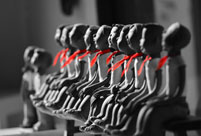 A date with 798: feel the art around you
A date with 798: feel the art around you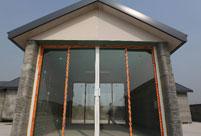 3D-printed houses built in Shanghai
3D-printed houses built in Shanghai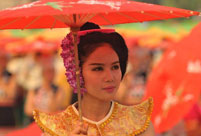 World largest scale of umbrella dance
World largest scale of umbrella dance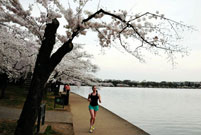 Cherry blossoms reach peak bloom in Washington D.C.
Cherry blossoms reach peak bloom in Washington D.C. Red terraced fields in Dongchuan of Yunnan
Red terraced fields in Dongchuan of Yunnan Presentation ceremony of 33rd Hong Kong Film Awards
Presentation ceremony of 33rd Hong Kong Film Awards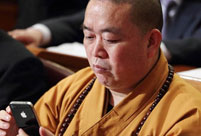 Cyber life of monks and nuns
Cyber life of monks and nuns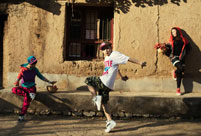 Let's dance in harmonic Shaanxi
Let's dance in harmonic Shaanxi The backstage of the Fashion Week
The backstage of the Fashion Week College students in Han costumes
College students in Han costumes Postgraduate works as waitress
Postgraduate works as waitress Life in a Lahu village in Yunnan
Life in a Lahu village in Yunnan An orphan’s wedding
An orphan’s wedding Hollywood documentary brings Diaoyu Islands truth to new audience
Hollywood documentary brings Diaoyu Islands truth to new audienceDay|Week|Month